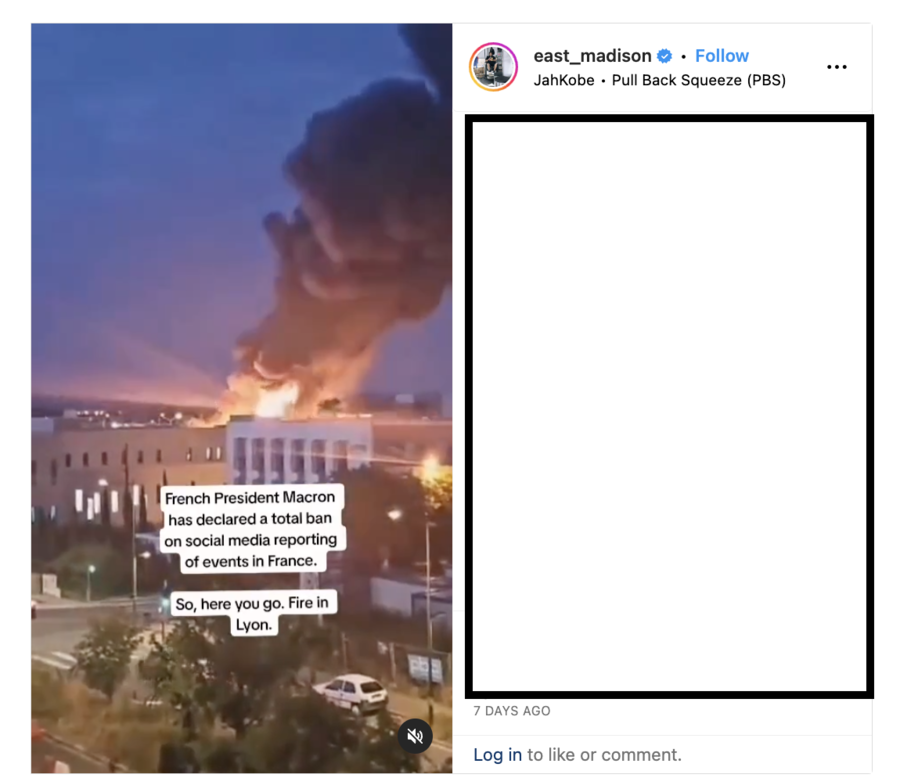
Did French President Emmanuel Macron impose "a total ban" on the use of social media or implement any other major restrictions on internet access in France in connection with mass protests? No, that's not true: While Macron did bring up the idea of shutting down social media, no such executive action was taken as of this writing.
The claim appeared in a post on Instagram on July 3, 2023. It contained a video titled:
French President Macron has declared a total ban on social media reporting of events in France.
This is what it looked like on Instagram at the time of writing:
(Source: Instagram screenshot taken on Mon Jul 10 17:58:22 2023 UTC)
The claim started to circulate shortly after 17-year-old Nahel Merzouk was shot to death by a police officer in a Paris suburb as the teenager attempted to drive away during a traffic stop on June 27, 2023. That triggered almost a weeklong mass unrest in France at the end of June 2023.
During a televised government emergency meeting on June 30, 2023, Macron blamed social media for helping protesters to organize, Reuters reported. As a result, the French government announced it would ask platforms to remove "the most sensitive types of content" and disclose the identities of "those who use these social networks to call for disorder and promote violence." Yet, no "total ban" was imposed.
After that, an image of what looked like an official press release claiming that the French president had banned social media started to circulate on the Internet. As translated by Google, it was titled:
REINFORCED SECURITY FOLLOWING THE RIOTS
The so-called press release described the allegedly introduced measures as "exceptional" and justified them by citing "public security and tranquility in the contexts of the recent riots":
From July 3 and for a fixed period, temporary restrictions will be applied to Internet access in certain specific neighborhoods during night hours. These restrictions aim to prevent the misuse of social media and online platforms to coordinate illegal actions and incite violence.
Later on July 2, 2023, the French Ministry of the Interior and Overseas refuted the rumor via its official account on Twitter, as translated to English by Google Chrome:
#UrbanViolence | Beware of #FakeNews A press release from the
📃 @PoliceNationale would announce temporary restrictions on internet access in certain neighborhoods.
❌ This document is a FALSE: no decision has been taken in this regard
On July 3, 2023, the French Ministry of Foreign Affairs issued the same statement in English on Twitter.
Two days later, however, Le Monde, one of the major French newspapers, reported that on July 4, 2023, Macron suggested resorting to extreme measures during the gathering of "mayors of 200 communes" at the Elysée Palace:
We need to have a think about social media, about the bans we need to put in place ... And when things get out of hand, we may need to put ourselves in a position to regulate or cut them off.
The president of the Republic himself said earlier that we must not take measures that are too harsh in the heat of the moment that we may regret later, but we need to start thinking about this. I propose that we engage in this reflection together [as part of the discussions on the digital bill] so that by September we can find the wording that will suit us.
The bill Barrot referred to had been introduced in May 2023, after winter mass rallies against the rise of the retirement age but weeks before the end-of-June wave of protests. Its provisions included blocking resources known for facilitating online scams or pornographic content without age restrictions as well as social media accounts of the people convicted of hate speech.
Lead Stories contacted the press office of the French Ministry of the Interior. On July 11, 2023, a spokesperson replied by sharing the July 2, 2023, tweet, adding in French that "this is the only information we have" and referring to the office of the prime minister for further comments.
When asked directly in a follow-up email if the ministry can confirm or deny the presence of any of the rumored restrictions on the use of the internet or social media at the present moment, the press officer replied, as translated from French by DeepL:
As indicated in the tweet, this is false information.
Had the claim in question been true, a presidential "total ban" on social media would produce a public record such as an executive order. However, the governing system in France is different from the one in the United States. While its president enjoys more powers compared to his counterparts in some other European countries, an introduction of any major change initiated solely by the head of the state who chooses to bypass both the government and parliament would be considered an extraordinary situation.
Article 16 of the French constitution does grant emergency powers to the president but only during an outstanding national crisis and for a limited period of time:
Where the institutions of the Republic, the independence of the Nation, the integrity of its territory or the fulfillment of its international commitments are under serious and immediate threat, and where the proper functioning of the constitutional public authorities is interrupted, the President of the Republic shall take measures required by these circumstances, after formally consulting the Prime Minister, the Presidents of the Houses of Parliament and the Constitutional Council.
He shall address the Nation and inform it of such measures.
The measures shall be designed to provide the constitutional public authorities as swiftly as possible, with the means to carry out their duties. The Constitutional Council shall be consulted with regard to such measures.
Parliament shall sit as of right.
The National Assembly shall not be dissolved during the exercise of such emergency powers.
No such announcement has been made by Macron in 2023.
Over the course of French history, Article 16 has only been invoked once: by Charles De Gaulle in 1961.
As of this writing, the two latest press releases appeared on the official website of the French president on June 23, 2023. One was titled "Multilateral Development Banks Vision Statement," and the other one was "The Paris Agenda for People and the Planet," making it clear neither had anything to do with the internet or protests.
The most recent update on the website of the French government said that on July 6, 2023, the nation's prime minister Élisabeth Borne visited the area affected by the unrest and announced, as translated by DeepL, that "law and order measures would be taken on July 13 and 14" during Bastille Day celebrations but made no specific mention on the new restrictions on the use of the Internet.
According to the website of the French parliament, it passed a law for the last time on June 26, 2023, and that piece of legislation discussed "the continuity of the representation of the municipalities within the community councils," not a "total ban" on social media.
A global Internet shutdown tracker didn't show that ever taking place in France:
(Source: Internetsociety.org screenshot taken on Tue Jul 11 17:04:58 2023 UTC)
No credible media reports indicated otherwise.
Similar claims about the purported restrictions on Internet access or social media shutdowns in France were debunked by the Associated Press, Politifact and Snopes.
Other Lead Stories fact checks about France can be found here.



















